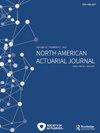Ensemble Economic Scenario Generators: Unity Makes Strength
IF 1.6
Q3 BUSINESS, FINANCE
引用次数: 1
Abstract
Over the last 40 years, various frameworks have been proposed to model economic and financial variables relevant to actuaries. These models are helpful, but searching for a unique model that gives optimal forecasting performance can be frustrating and ultimately futile. This study therefore investigates whether we can create better, more reliable economic scenario generators by combining them. We first consider eight prominent economic scenario generators and apply Bayesian estimation techniques to them, thus allowing us to account for parameter uncertainty. We then rely on predictive distribution stacking to obtain optimal model weights that prescribe how the models should be averaged. The weights are constructed in a leave-future-out fashion to build truly out-of-sample forecasts. An extensive empirical study based on three economies—the United States, Canada, and the United Kingdom—and data from 1992 to 2021 is performed. We find that the optimal weights change over time and differ from one economy to another. The out-of-sample behavior of the ensemble model compares favorably to the other eight models: the ensemble model’s performance is substantially better than that of the worse models and comparable to that of the better models. Creating ensembles is thus beneficial from an out-of-sample perspective because it allows for robust and reasonable forecasts.集合经济场景生成器:团结造就力量
在过去的40年里,人们提出了各种框架来模拟与精算师相关的经济和金融变量。这些模型是有帮助的,但寻找一个能提供最佳预测性能的独特模型可能会令人沮丧,最终也是徒劳的。因此,这项研究调查了我们是否可以通过组合它们来创建更好、更可靠的经济情景生成器。我们首先考虑八个突出的经济情景生成器,并将贝叶斯估计技术应用于它们,从而使我们能够考虑参数的不确定性。然后,我们依靠预测分布叠加来获得最优模型权重,该权重规定了如何对模型进行平均。权重是以忽略未来的方式构建的,以构建真正的样本外预测。基于美国、加拿大和英国这三个经济体以及1992年至2021年的数据进行了广泛的实证研究。我们发现,最优权重随着时间的推移而变化,并且随着经济体的不同而不同。集成模型的样本外行为与其他八个模型相比是有利的:集成模型的性能明显好于较差模型的性能,也与较好模型的性能相当。因此,从样本外的角度来看,创建集合是有益的,因为它可以进行稳健合理的预测。
本文章由计算机程序翻译,如有差异,请以英文原文为准。
求助全文
约1分钟内获得全文
求助全文

 求助内容:
求助内容: 应助结果提醒方式:
应助结果提醒方式:


